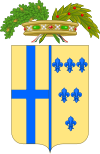Province of Parma
| Province of Parma | ||
|---|---|---|
| Province | ||
|
||
 Map highlighting the location of the province of Parma in Italy |
||
| Country |
|
|
| Region | Emilia-Romagna | |
| Capital(s) | Parma | |
| Comuni | 47 | |
| Government | ||
| • President | Filippo Fritelli | |
| Area | ||
| • Total | 3,449 km2 (1,332 sq mi) | |
| Population (1 January 2016) | ||
| • Total | 447,779 | |
| • Density | 130/km2 (340/sq mi) | |
| Time zone | CET (UTC+1) | |
| • Summer (DST) | CEST (UTC+2) | |
| Postal code | 43010-43015 43017-43019 43021-43022 43024-43025 43028-43030 43032 43035-43045 43047 43049-43053 43055 43058-43059 43100 |
|
| Telephone prefix | 0521, 0524, 0525 | |
| Vehicle registration | PR | |
| ISTAT | 034 | |
The Province of Parma (Italian: Provincia di Parma) is a province in the Emilia-Romagna region of Italy. Its largest town and capital is the city of Parma.
It is made up of 47 sub-divisions called comuni, which have their own elected sindaco (mayor), legislative body and executive body. It has an area of 3,449 square kilometres (1,332 sq mi) and a total population of about 475,000.
The province is enclosed by the Province of Reggio Emilia to the east, the Piacenza to the west, Lombardy's provinces of Cremona and Mantova to the north and Liguria's provinces of Spezia and Genoa.
It was to be merged with the Province of Piacenza in 2014 to form the Province of Parma-Piacenza.
In 1861, Italian provinces were established on the French republican model.
Italian Fascism saw the end of elections in the Province of Parma in the 1920s until the end of the Second World War.
In October 2012, it was confirmed that the Province of Parma would be merged with the Province of Piacenza in 2014 to become the Province of Piacenza and Parma, despite controversy over the chosen name. However, its name was altered to the Province of Parma–Piacenza in the following month.
The province is divided into three zones from north to south: the pianura (plains), the collina (hills) and the montagna (mountains). The first of these is surrounded by the Po. The main centres of the collina and montagna are situated along the course of the main rivers, which descend from the Parmesan Apennine Mountains.
...
Wikipedia

